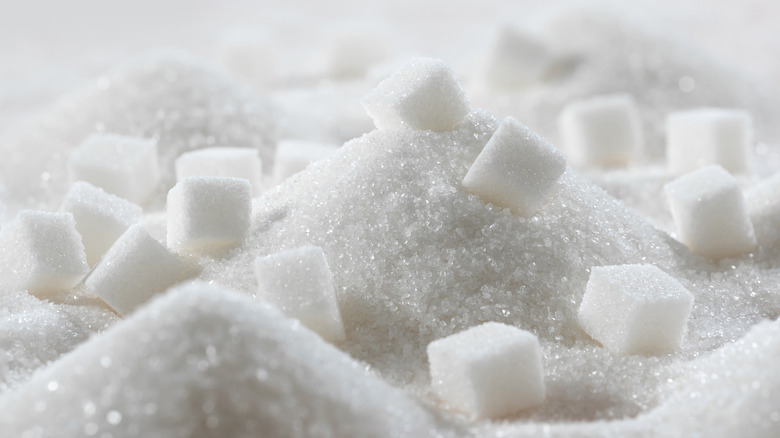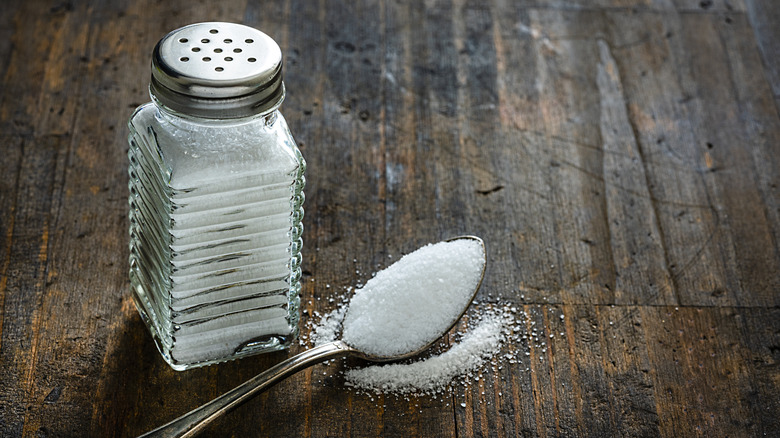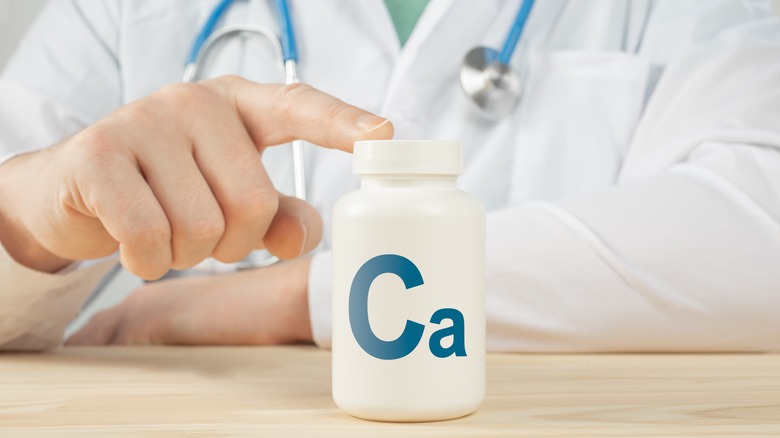Is Frozen Yogurt Actually Better For You Than Soft-Serve?
When it comes to frozen yogurt versus ice cream, most of us can agree that they're both totally delish, right? Still, there's a common assumption out there that propagates frozen yogurt as the ultimate health pick when you're in the mood for something smooth, delicious, and creamy. But, how true is this? Is frozen yogurt actually more nutritious for you than soft serve?
We've dug out our magnifying glasses to examine labels, nutrition facts, ingredient lists, and more to bring you the information you're itching to know concerning the actual health benefits (or lack thereof) of ice cream versus frozen yogurt. We've broken each finding down into categories to give you the most specific and accurate information to help you make your own informed decision about which of the two is right for you.
Ready to learn more? Get your spoons ready. We're about to dig in to find out whether frozen yogurt is actually healthier than soft-serve ice cream.
Fat content: yes
When it comes to whether frozen yogurt is actually better for you than soft serve, it's important to note that this is one category where frozen yogurt truly does shine. In most cases, you'll find that ice cream has loads more fat in it than frozen yogurt, especially if the frozen yogurt variety you buy is of the low-fat sort.
Does this rule hold true without exception? Well, not in every instance, but it's safe to say that this verdict overwhelmingly dominates the arena. Some frozen yogurt ice cream shops, like Menchie's, brag about having 0-½ grams of fat per ounce in their frozen yogurt without even a trace of saturated fat. Depending on how many ounces you get, that could be a more health-conscious pick. Comparatively, even a kid's cone from Dairy Queen features at least 4 ½ grams of fat along with 3 grams of saturated fat to match.
These facts alone make it clear that frozen yogurt is, usually, the healthier choice when compared to traditional ice cream. Oh, and low-fat ice cream? Sorry, but frozen yogurt still typically wins out when compared even against reduced-fat ice cream brands. Now you know!
Sugar content: maybe
This might come as a shocker to most, but frozen yogurt, even the healthier, low-fat variety, does not automatically contain less sugar. In fact, in most cases, we've found that frozen yogurt and ice cream pack about the same amount of sugar per serving, and sometimes, frozen yogurt may pack even more.
Surprised? We were, too! Here's the scoop: While low-fat or diet-friendly options might sound great, they often play a sneaky trick with added sugars to compensate for their lack of fat-induced flavor. While this might not always be the case for frozen yogurt, a quick glance over nutrition facts across store-bought frozen yogurt suggests there is little advantage — if any at all — to eating frozen yogurt over ice cream in terms of sugar content.
Having said that, we will admit that there are exceptions to this rule. In the case of Menchie's frozen yogurt, a single-ounce serving of froyo doesn't typically exceed 6 grams of sugar, while even Dairy Queen's kiddie-sized cone packs a whopping 18 grams. We guess it really depends on where you go, but also, how much you eat. Just know that if you fill your dish with lots of froyo — anything more than 3 ounces — it's possible that you'll still end up with about the same amount of sugar, or more, than ice cream.
Carb content: no
Much like sugar, the carb content in frozen yogurt is rarely better than ice cream. In fact, in some cases, the carb content in frozen yogurt is sometimes higher. Why? For many reasons, including any additional mixings or toppings you pair with your froyo. Having said that, if your frozen yogurt is already packed with lots of sugar, you can usually expect the carb content to follow suit.
Oh, and just when you thought you could sail smoothly with sugar-free froyo, the plot deliciously thickens. Sugar-free frozen yogurt can still pack a wallop in the carb count category, with some sugar-free varieties sold in stores containing as much as 18 grams or more of carbohydrates per serving despite containing little to no sugar. We won't pretend to understand why this is the case, but at the end of the day, you shouldn't automatically assume that your frozen yogurt will contain fewer carbs than soft serve or any other ice cream type; it simply isn't true.
Sodium content: no
We know, we know. Sodium isn't (usually) a concern when it comes to soft-serve ice cream or frozen yogurt. Still, it's worth noting its content, as both ice cream and froyo do tend to contain a little of it. Looking at froyo shops like Orange Leaf, we can see that their frozen yogurt contains about 45 mg or less of sodium per ounce. Depending on how many ounces of frozen yogurt you get, this may or may not end up being more than what you'd get from traditional, soft-serve ice cream.
For example, a typical McDonald's vanilla soft serve cone will contain about 80 mg of sodium, about 3% of the recommended daily value. The same is true of store-bought vanilla ice cream, which normally weighs in at around 65 mg per 5 ounces. Store-bought vanilla froyo comes at about 75 mg per 5 ounces.
So, as with most nutrition facts provided here, it's important to note that brand and portion size matter when it comes to comparing the sodium content of frozen yogurt and ice cream. Nevertheless, the consensus is that frozen yogurt isn't typically any better for you in relation to sodium.
Calories: yes
Despite frozen yogurt and ice cream having virtually the same amount of sugar and carbs per serving comparatively, you shouldn't expect the same to be true for calories. Actually, frozen yogurt is typically lower in calories than its creamier counterpart. If you're a calorie-counting ice cream eater, you may have better luck in this department by making the switch over to frozen yogurt, at least in most cases. There will always be outliers out there, especially for more decadent options. If dining in-shop at a local froyo facility, bear in mind that your toppings will add additional calories, too.
To know for sure, you should always check the nutrition facts, either for the soft-serve ice cream you plan to eat or the nutrition facts for the frozen yogurt shop you frequent. Of course, buying either of these in-store will be much easier to assess since nutrition facts are almost always listed on the label. But, don't go grabbing the big spoon just yet! Be sure to consider serving size when comparing calorie choices for the most accurate information.
Artificial coloring: maybe
Artificial coloring is a divisive and controversial subject, especially given that some research seems to hint that it can have potentially adverse effects on children's behavior (via WebMD). As a result, you may have concerns about whether frozen yogurt contains artificial coloring the way that many vibrant-colored ice creams do.
The answer? It really depends. While froyo shops often keep their ingredient secrets locked away, those vibrant flavors gracing some shop counters might just hint to a hidden affair with artificial coloring. Having said that, most frozen yogurt brands sold in-market, even those colored a spirited green, are colored naturally with ingredients like spirulina extract, while ice cream brands tend to feature either natural or artificial coloring depending on the brand.
Considering these discrepancies, it's hard for us to give a solid yay or nay when it comes to whether your frozen yogurt will pack as many artificial colors as typical soft-serve ice cream. Still, it's important to note that basic ice cream flavors, such as vanilla or chocolate, will rarely — if ever — contain artificial food coloring since the cream in vanilla and cocoa in chocolate lend naturally bold colors on their own.
Additives: maybe
Whether your soft-serve ice cream will have more additives than your frozen yogurt will depend on the brand. Much like with the use of artificial coloring, the manufacturer plays a big role here. Places like Menchie's feature ingredients like stabilizers, emulsifiers, and sometimes even artificial flavoring in their goodies despite being a potentially lower-calorie and lower-fat treat.
Soft serve often features similar ingredients. For example, McDonald's vanilla cones come with carrageenan, gums, and other ingredients very similar to that of your local froyo shop, but in most cases, still manage to nix the artificial flavoring.
When comparing in-store brands of frozen yogurt and ice cream, we did note lesser use of additives in frozen yogurt, depending on the brand. But, the machine-ready versions of yogurt sold in shops show the real difference, making these frozen yogurt types much more similar to traditional ice cream in terms of additives. In these cases, frozen yogurt is not necessarily a better choice, depending on where you get it from.
Lactose-intolerant friendly: maybe
People who have sensitivities to dairy may assume that frozen yogurt may be easier on their stomach than traditional ice cream. Are they right? Actually, this isn't too far from the truth. But, like everything else, this really depends on the person and the brand or establishment.
While soft serve undeniably contains milk and heavy cream that could potentially cause problems for people who are sensitive to dairy, the same isn't as clear-cut when it comes to froyo. Traditional yogurt bought from a store that contains live and active cultures may indeed be easier on the gut. This is because these live and active cultures can sometimes produce the lactase enzyme on their own, making it gentler on the delicate stomach (per Tufts).
The problem is that many froyo shops may not feature yogurt that contains as many live and active cultures as the traditional yogurt sort. Because of this, whether the milk in the yogurt sold in your local frozen yogurt shop will cause you issues as a person with lactose intolerance is up in the air. It will depend on your level of sensitivity and also how the yogurt in that particular shop is made. As for soft-serve ice cream, just steer clear. Though delicious, its heavy cream and other dairy components are bound to cause you issues.
rBST: no
When it comes to whether frozen yogurt is better for you in terms of rBST content, the answer is (usually) no. In case you aren't aware, rBST is a type of growth hormone that is commonly injected into cows to increase dairy production. This hormone is thought to cause adverse effects in people, albeit the research on the topic isn't entirely clear. Either way, because the labeling of rBST (or rBGH) is not required for food producers as of the time of this written post, it can be hard to determine whether frozen yogurt or ice cream wins out in terms of which uses these growth hormones most often.
The most likely answer? They're both one and the same. Though companies like Menchie's pride themselves on the absence of rBST in their cream and milk, you'll likely find several soft-serve companies claiming the same. The fact of the matter is that rBST-free milk and dairy products are hit or miss in reference to availability, as manufacturers can choose whether to use rBST and don't necessarily have to notify customers that they're doing so.
The bottom line is that if it's rBST-free ice cream or yogurt you're after, you'll have to do some label investigation or call up companies to find the right ice cream or froyo for you. Otherwise, it's safe to assume that both frozen yogurt and ice cream come from rBST-treated cows, so frozen yogurt doesn't win out as better for you in this regard, either.
Probiotics: yes (most times ...)
You probably already know this, but one of the reasons yogurt is so healthy for you is because of the probiotics it's stocked with. This version of "good" bacteria comes from the fermentation process, is healthy for your gut, and packs a wide variety of benefits (from Harvard). This automatically makes yogurt a more thoughtful choice over ice cream, especially given yogurt's other benefits already mentioned in this article. But, is your standard froyo quite the same as refrigerated yogurt that contains these healthy strains of bacteria?
Most likely not. Still, there are some frozen yogurt companies that claim to feature important live and active probiotic strains including Lactobacillus bulgaricus and Streptococcus thermophilus, but you should note that this won't always be the case. The amount of probiotics preserved will vary from one frozen yogurt location to another and also varies across store-bought brands. Thus, unless a froyo shop or brand specifically points out the fact that they have live and active probiotic cultures, it's safe to assume your frozen yogurt either contains none or very little.
Calcium: maybe
When it comes to getting a healthy dose of much-needed calcium, it can feel good to know that you're at least doing your body a bit of good when consuming sugar-laden dairy products since many of them contain an ample amount of calcium. With that said, you may be wondering whether frozen yogurt contains more calcium in it than its fattier and more decadent counterpart. The answer? Not really.
Whether frozen yogurt contains more calcium than traditional yogurt significantly varies depending on where you go. Ice cream and frozen yogurt in general tend to differ depending on the manufacturer, with some types of frozen yogurt even containing less calcium than some brands of ice cream.
With that said, like with most dairy products, you can expect to at least get a hearty dose of calcium no matter which of the two treats you choose. But, if you're expecting frozen yogurt to win out on this one, you might just find yourself surprised; ice cream can actually provide you with a bit more calcium benefit, but again, it will really depend on who is scooping it.
Long-term health effects: no
Finally, let's take a look at the overarching health benefits (or lack thereof) of eating frozen yogurt versus ice cream. With all things considered, you should make note of the fact that both are often very high in sugar, which, on its own, is enough to make either choice a potential health risk when eating on a frequent and long-term basis (per the American Heart Association).
The fat content and calorie content of ice cream also present a risk, especially for those already predisposed to issues with cholesterol levels, heart disease, or the like. Still, because of frozen yogurt's very few benefits when compared to regular ice cream, we're going to say that neither ice cream nor frozen yogurt is best for long-term consumption when it comes to ongoing and frequent eating. Instead, it is best to consume these sugar-laden dairy products only on occasion, despite frozen yogurt's seemingly healthier ingredients at times. It isn't worth the risk!












